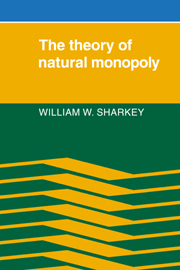Book contents
- Frontmatter
- Contents
- Preface
- 1 Introduction and overview
- 2 Historical survey of natural monopoly
- 3 Natural monopoly and economic theory: some basic results
- 4 Natural monopoly and subadditivity of costs
- 5 Sustainability of natural monopoly
- 6 A game theoretic analysis of destructive competition
- 7 Competition in natural monopoly and natural oligopoly markets
- 8 Noncooperative equilibria in a contestable market
- 9 Natural monopoly and the telecommunications industry
- References
- Index
9 - Natural monopoly and the telecommunications industry
Published online by Cambridge University Press: 06 October 2009
- Frontmatter
- Contents
- Preface
- 1 Introduction and overview
- 2 Historical survey of natural monopoly
- 3 Natural monopoly and economic theory: some basic results
- 4 Natural monopoly and subadditivity of costs
- 5 Sustainability of natural monopoly
- 6 A game theoretic analysis of destructive competition
- 7 Competition in natural monopoly and natural oligopoly markets
- 8 Noncooperative equilibria in a contestable market
- 9 Natural monopoly and the telecommunications industry
- References
- Index
Summary
Chapters 4 through 8 have developed a theory of natural monopoly in highly abstract terms. In this concluding chapter some of that theory will be applied in an examination of both the institutional and technological structure of the telecommunications industry. The function of this chapter is not to determine whether or not the telecommunications industry is a natural monopoly. Instead, the chapter will satisfy three more modest objectives: (1) The major elements of the theory will be reviewed in the more concrete and structured setting of the telecommunications industry. (2) Existing empirical studies of the industry will be evaluated. (3) Issues relevant to the future theoretical and applied research will be discussed.
Section 9.1 will consider the nature of demand in telecommunications markets. There are a number of important characteristics, some of which are shared by other industries and some that are unique to telecommunications. The demand for communication is inherently a two-party interdependent process. Furthermore, the demand is time dependent but varies over time, and the output of the industry is nonstorable. Finally, demand in telecommunications is a demand for access to the network and potential use, as well as a demand for actual transmission of messages. Each of these characteristics will be shown to have a specific effect on telecommunications costs and in particular on the subadditivity of costs.
In Section 9.2 telecommunications technology for transmission, switching, network planning, and network operation will be discussed.
- Type
- Chapter
- Information
- The Theory of Natural Monopoly , pp. 181 - 213Publisher: Cambridge University PressPrint publication year: 1982



